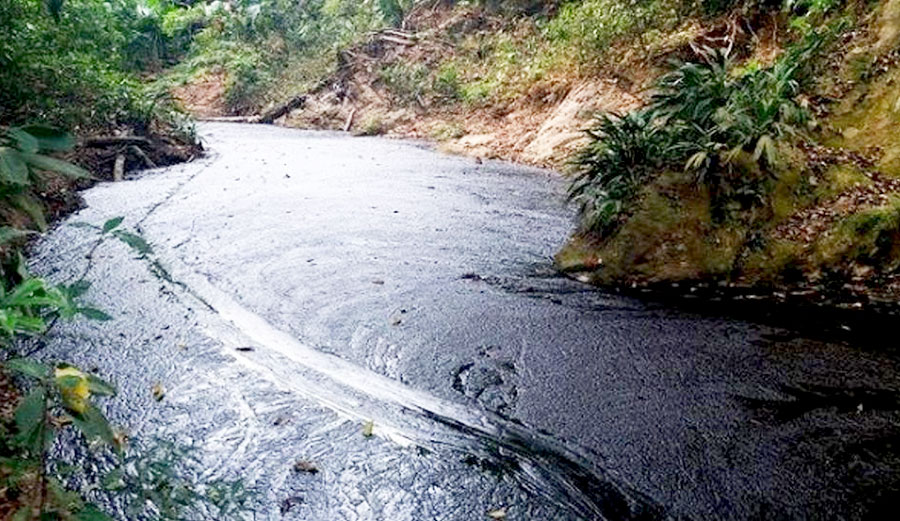
Ecopetrol spilled some 23,000 gallons of crude oil into the Rio Magdalena. Image: Ecowatch
On March 2nd, an oil well burst and spewed a massive amount of crude oil that made its way into Colombia’s Magdalena River. Within a month, over 2,000 animals were dead, killed by an oil company’s clumsy accident and ensuing cleanup mistakes. Families along the river have been relocated, many with varying symptoms that include vomiting, headaches, and bouts of dizziness.
“Nothing like this has happened before,” said Julio Carrizosa, an environmentalist in the area, to France24. “This is a warning of what oil extraction can bring in vulnerable places where people still live from nature. That’s why we have to be more careful with oil extracting.”
Officials from the National Authority of Environmental Licensing explained that although the spill occurred on March 2nd, the cleanup efforts were not only almost entirely ineffective, but the company took nearly three weeks to even get them underway. Now, the Ecopetrol is facing sanctions from Colombia’s Ministry of Environment “for its inability to control the major spill and for the extensive damage it has caused.”
The Rio Magdalena is Colombia’s largest river, flowing north for nearly 1,000 miles from the Colombian Andes before reaching its delta at the city of Barranquilla, on the Caribbean Sea. The river is massive—its drainage basin alone covers over 100,000 square miles and over 60 percent of the population calls the area home. It should go without saying that, like most rivers, it is very, very important to the ecosystem it flows through.
According to National Geographic, conservationists in the area are calling it the worst environmental disaster in Colombia in decades. Ecopetrol—which, given the circumstances, is probably the most ironic name one could come up with—the company taking fire for the oil spill, says that 550 barrels (23,000 gallons) of crude were spilled, a number vastly different than is being reported by media outlets. One in particular, Q24N, a Latin News aggregator, wrote that up to 24,000 barrels were released into the river.
“I have practically nothing to eat,” Elkin Cala, a resident told the Colombian television station Noticias Uno. “We have lived through the river all our lives and the contamination has already reached the Magdalena.”
Reports vary widely of the real impact of the spill. While Ecopetrol says that the spill is under control and 1,250 animals have been saved, locals are telling a different story. According to them, the crude is still flowing, and it’s made its way into various tributaries of the Rio Magdalena.
“When oil spills happen, just coming into contact with oil in the short term has incredibly horrible side-effects,” said researcher and National Geographic Explorer Rebecca Wolff. While Wolff was speaking about humans, there are long-lasting effects on the local flora and fauna, as well. Contaminated soils end up in farmers’ fields and poison the fish in the river, which, of course, impacts the food source and economy of those who live nearby.
Wolff went on to say that all too often, the government’s response falls short. According to National Geographic, government cleanup efforts generally only last two months. The effects of large, far-reaching spills, however, last for years. “There is continual danger for years and years of what’s in the fish and what’s in the water,” Wolff says. “If you ruin the water and the land that people depend on, their livelihood is gone The world needs to pay better attention and have better response plans,” Wolff says. “[Oil spills happen] all over the world, but I don’t think we’ve come to a [far enough] way to respond and support the affected community afterwards.”

